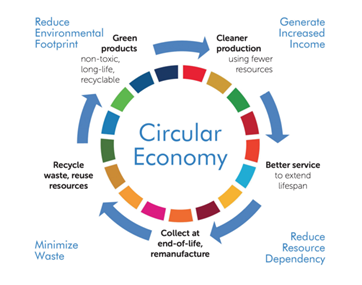Circular Economy & Circular Development
The Anthropocene has signed an era of extreme human activity with unprecedented impacts on the earth’s systems and natural resources. The industrial revolution and the rise of a capitalistic society have, in a short period of time, changed our planet and our lives. Overconsumption stands at the foundation of modern society and has brought along climate change and its string of environmental hazards and social issues.
The intensified rhythm of mass production “naturally” requires more natural resources than what the earth carrying capacity – the so-called “planetary boundaries” – can provide. Such unsustainable consumption will increase if we keep with our linear ‘take – make – dispose’ economic models.
Overpopulation and growing demand for goods result in mind-boggling volumes of waste as well as air, soil and water pollution with high negative impacts on human and ecosystem health. Although the detrimental effects of this linear consumption cycle are well-known, sustainable production, supply and efficient use of resources also represent global challenges to be tackled.


Circular economy holds potential to transform deeply our economy’s structure (Credit: UNIDO)
The birth of a circular model
Innovative production and consumption strategies are still required to reduce human pressure on the environment and bike towards global sustainable development goals. In the last decades, a new framework emerged, shaped around thrifty waste and resource management, captured by the concept of circular economy.
